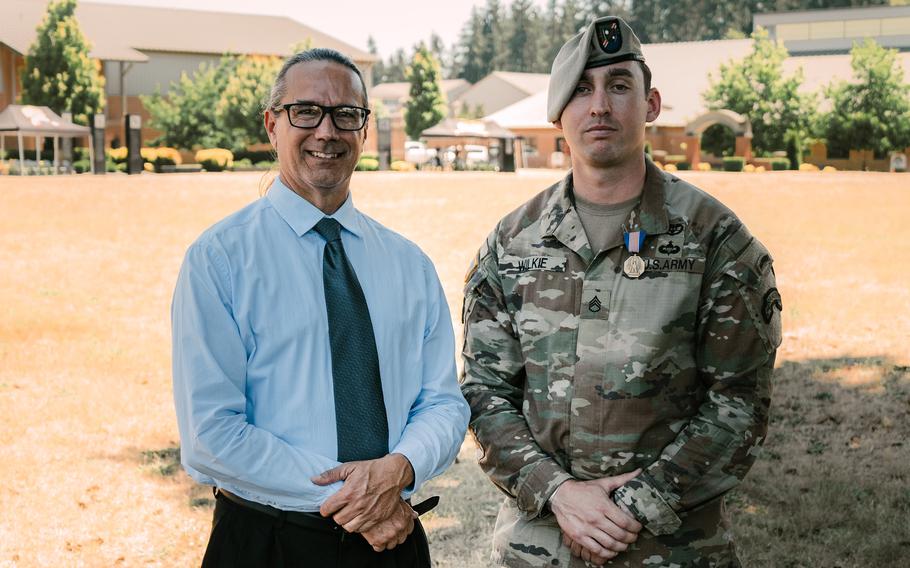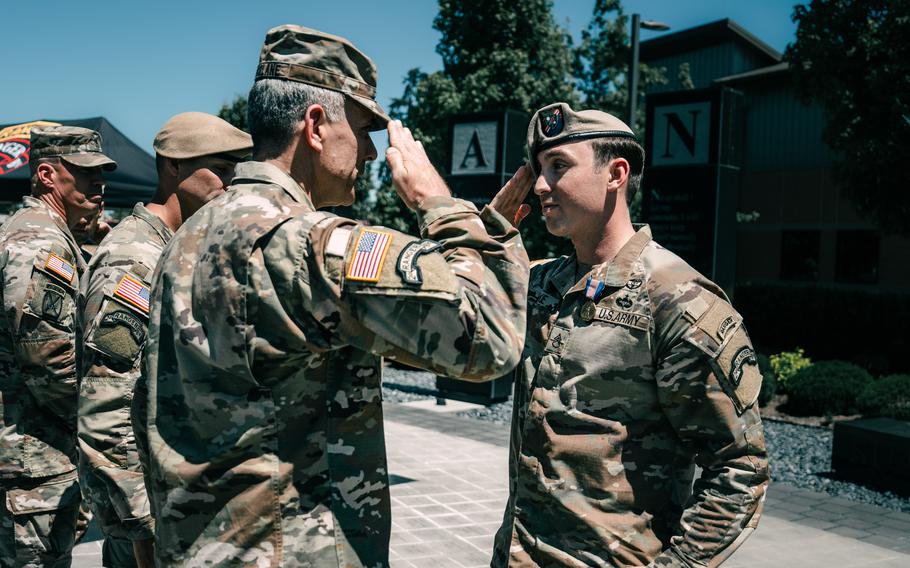
Chris Zwierzynski, left, and Army Staff Sgt. Callum Wilkie at Joint Base Lewis-McChord, Wash., during a ceremony Monday, June 9, 2025, in which Wilkie received the Soldier’s Medal for saving Zwierzynski’s life after a 500-foot fall on Mount Hood in Oregon in July 2024. (U.S. Army)
JOINT BASE LEWIS-MCCHORD, Wash. — Army Staff Sgt. Callum Wilkie had just met Chris Zwierzynski as they were separately traveling up the Old Chute Route to the summit of Mount Hood, the 11,249-foot dormant volcano east of Portland, which is the highest point in Oregon.
Moments later, Wilkie saw Zwierzynski stumble and plummet more than 500 feet down the ice- and rock-strewn face of the mountain.
“Just one bad step, and he fell right past me,” Wilkie recalled Monday.
Zwierzynski said he recalled little from the potentially fatal fall.
“I hit my head, I had eight broken ribs, a shattered left foot, head injuries, some internal injuries,” he said.
Wilkie, the senior medic for the 2nd Battalion, 75th Ranger Regiment at Joint Base Lewis-McChord, made the treacherous climb down to where Zwierzynski lay unconscious.
“No bullets or bomb fragments like in combat, but a lot of damage,” Wilkie said.
The two men were reunited Monday at a ceremony at Lewis-McChord, where Wilkie received the Soldier’s Medal for his seven-hour effort to save Zwierzynski’s life in July 2024. It’s the Army’s highest award for valor and bravery in a non-combat situation.
“It takes a special human to ignore their own fears, their own pain, their own anxiety, to alleviate that for another,” said Lt. Col. Peter Leszczynski, the commander of the 2nd Battalion, 75th Ranger Regiment. “To act not for fame or reward, not for place or for rank, neither lured by ambition nor goaded by necessity, but in the simple obedience to one’s duty — their duty to humanity.”

Army Lt. Gen. Matthew McFarlane, I Corps commander, left, exchanges a salute with Staff Sgt. Callum Wilkie, after pinning a Soldier’s Medal on Wilkie’s uniform during a June 9, 2025, ceremony at the 2nd Battalion, 75th Ranger Regiment compound on Joint Base Lewis-McChord, Wash. (U.S. Army)
Lt. Gen. Matthew McFarlane, I Corps commander, pinned the medal on Wilkie’s camouflage uniform, saluted, then shook his hand.
“Staff Sgt. Wilkie upheld the prestige, honor and highest values of this Ranger regiment,” McFarlane said. “Over seven hours, at great personal risk, he demonstrated heroism. He lived the Ranger creed that Rangers lead the way.”
Wilkie and a fellow Army medic were on leave and decided to hike Mount Hood. A native of Twain Harte, Calif., near Yosemite National Park, Wilkie was on familiar ground, having hiked to the Mount Hood summit at least three times.
The Army said Wilkie has climbed 46 of Washington’s 100 highest peaks. In the summer, he’ll lead 60 Rangers on a search-and-rescue training hike up Mount Rainier, the 14,411-foot inactive volcano that seems to loom over Lewis-McChord, just 31 miles to the southeast.
Zwierzynski, 56, who works for a trucking company in Scottsdale, Ariz., was building his experience. On his 50th birthday, he had made a pact with himself to hike to the highest point in all 50 states.
About 10,000 hikers each year attempt to climb to the top of Mount Hood, according to the Oregonian newspaper. Mount Hood is a climb that requires ice axes, ropes and crampons — the steel spikes attached to the bottom of boots for traction on ice.
More than 130 people have died hiking on Mount Hood since the peak was first reached in 1870. Each year, up to 50 people require rescue from the mountain, according to the Oregonian.
Zwierzynski was making the hike with three friends, but the group had separated as the challenges of the top part of the trail slowed progress.
Wilkie said he and his friend saw Zwierzynski climbing closer to the rock face of the mountain and encouraged him to take a safer route.
“We were just talking with him, trying to get him to move to our safe route, and just trying to ensure that he buddied up because he was by himself,” Wilkie said. “He’s about maybe an additional 15 to 20 feet ahead of us when he took a bad step and started to fall.”
Zwierzynski said he recalls just snippets of the beginning and end of the incident.
“I can remember as I started to slide, someone yelled out to me ‘use your ax’ to arrest my fall,” he said. “I don’t know if I did — I blacked out.”
Wilkie’s background as a medic took over.
“He was asking if they can cut my clothes to inspect my injuries,” Zwierzynski said. “I gave him my wife’s name and phone number. I couldn’t tell my name. Fast forward six hours later, I remember hearing the helicopter.”
Wilkie said he triaged the injuries, paying special attention to Zwierzynski’s broken left foot, which had no pulse.
“He knew that he had to keep it straight or by the time I got to a hospital, they would have to amputate,” Zwierzynski said. “He did that for six hours. If he hadn’t, I wouldn’t be standing here on two feet today.”
Wilkie said when Zwierzynski’s fall stopped, he was concerned it was fatal.
“I had a good friend in climbing, another Ranger, die in a climbing accident in May last year,” Wilkie said.
After hitting an SOS beacon that sent out an emergency call monitored by local search-and-rescue officers, Wilkie made his way down the mountainside.
When he reached Zwierzynski, Wilkie said his training as a Ranger medic — including his deployment to Afghanistan, where he aided wounded soldiers — “kicked in on the side of that mountain.”
“A big focus here is just to master the fundamentals,” he said. “I’m not carrying my gigantic aid bag on my back, like when I am on duty, but we practice how to improvise.”
With the help of other climbers and park rangers, Wilkie was able to stabilize Zwierzynski until an Oregon National Guard medical evacuation helicopter arrived and transported him to a hospital in Portland.
“We did everything we could to help him for the six or so hours,” Wilkie said.
The 75th Ranger Regiment nominated Wilkie for the Soldier’s Medal. The review process took nearly a year before it was approved.
Wilkie said he was honored to receive the award,but was only doing what he felt any Ranger would do in the same situation.
Zwierzynski said thanks to Wilkie’s swift action, he has been able to recover enough from the fall to restart his attempts to reach state high points. He plans to return to Mount Hood and try again.
Wilkie said he’d like to join him when that time comes.
“If he ever wants to climb Mount Hood, and I’m free, I’ll absolutely go and do it with him,” Wilkie said.